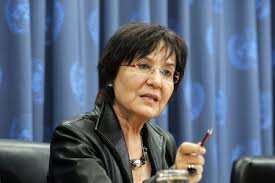On Saturday 13 july 2019, a large crowd gathered in Ashraf 3, Albania, home to Iranian opposition group People’s Mojahedin Organization of Iran (PMOI/MEK), to hold the annual Free Iran rally of the Iranian resistance. The event was the fourth installment in a series of events held at Ashraf 3. Yakin Ertuk gave a speech in this gathering.
Yakin Ertuk – UN Special Rapporteur on Violence Against Women (2003-2006)
Yakin Ertuk: I’m impressed with your energy. It seems endless. Keep it up. I would like to start by giving voice to a 12th century Persian poet, (Sadi). He said, “The children of Adam are limbs from one another, created from the single substance.
When one limb suffers misfortune the others cannot be addressed. You who do not suffer the pain of others do not deserve to be called human.” And this was written way before the French Revolution or the Universal Declaration of Human Rights, which shows that human rights is embedded into the culture of this region.
Now, the testimonies that we received yesterday from the Ashrafi residents put our humanity to test. I was saddened. I felt shame and rage. But I also felt hope. Seeing the survivors continue their struggle with determination and a smile on their face was very empowering.
Human dignity, I’m sure will defeat evil. In 2005, I was in Evin Prison. Fortunately, not as a prisoner but as a UN human rights rapporteur to monitor the situation of female prisoners. Of course, authorities were informed of my visit, so the conditions in the prison was very impressive.
Very clean, sheets nicely put, etc., and female prisoners with a frozen smile on their faces. But I did manage to talk to the prisoners and they did relay some of their experiences, some of which were very similar to the ones we heard here.
I’m from Turkey and we share a common history and a common region with Iran. Sometimes friendly, sometimes maybe not so friendly, but we do share much. We live in a troubled region, unfortunately. The geopolitics of the region and its unique strategic position has historically been a source of attraction to hegemonic powers, a cause of instability for individual powers, the region, and the world at large.
We, the people of the region, have aspirations for rights and freedoms which have often been taken hostage by other concerns such as oil, or security rhetoric, etc. This has at time provoked or justified repressive regimes and helped them to sustain their oppression.
As a social scientist, like many others I had predicted that the mullah regime would collapse because it has no basis after particularly the Iran-Iraq War. But this didn’t happen. They continued. The international context was not conducive. The mullah regime prevailed and oppression of Iranian people continued.
The 1979 Revolution launched a wholesale war on women of Iran and systemically became institutionalized. A misogyny which may be common throughout the world has become strictly observed in this country. Many human rights rapporteurs, particularly rapporteurs on the situation in Iran, including the late has repeatedly written about the continuing discrimination and violence against women.
But we must also acknowledge the resilience of women. For 40 years, women resisted the regime’s attempt to silence them and transgress their rights, on the street, in the social media, even in the privacy of their homes.
Women stood firm and became the most vocal voice of resisting political and social controls. The new generation of Iranian women who are the product of the revolution era are as bold, if not more, as their predecessors in defying boundaries imposed on them.
Streets of Tehran are increasingly more colorful and vocal. Women and men of Iran are ready, as you said, (Hazzer) to claim their freedom and determine their own destiny. Those of us who are supporters of freedom and justice in Iran must join forces in a more determined way to take measures that would empower the Iranian people’s struggles.
We also need to navigate the region’s geopolitical tensions and reject projects that can inflame the instability and the conflict in the region.
I would like to join Mrs. Rajavi who has argued that religious fascism can only be defeated by forces that reject misogyny. And in this context, women are a decisive factor. Iranian people, men and women alike, are the force of change. Until we meet in Tehran.
